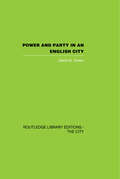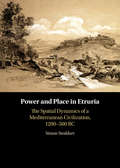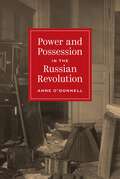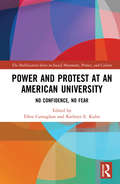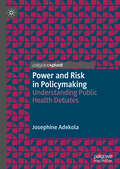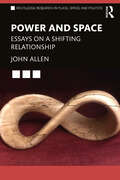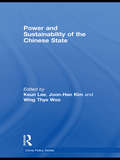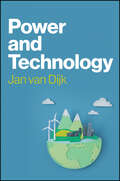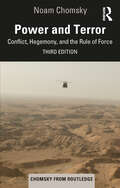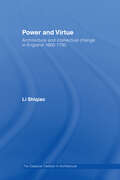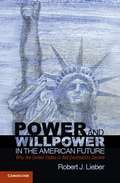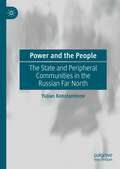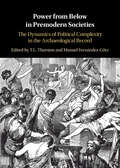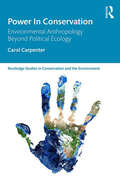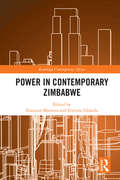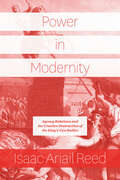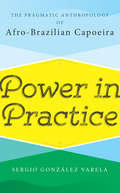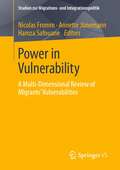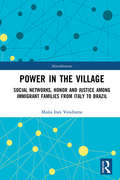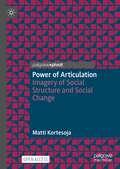- Table View
- List View
Power and Party in an English City: An account of single-party rule (The\new Local Government Ser. #No. 20)
by David G. GreenPower and Party in an English City provides an account of how decisions are taken by the state at the level of locality. More specifically, it is an account of the private policy-making activities of a ruling Labour group of councillors in the major English city of Newcastle-Upon-Tyne. Despite the fact that local government in most of the towns and cities of England is one-party government, very little is known abotu the private behaviour of ruling party groups. In this book David Green provides a penetrating empirical study of the realities of local government. The author seeks to examine and analyse the importance of party discipline, the relationship between the Labour group of councillors and the party outside the council, the power of the committee chairmen, the role of local patronage and the openness of the local policy-making process. The government of Newcastle is perhaps the most closely association in the public mind with T. Dan Smith, the corrupt local politician. In fact, Smith had left local politics in Newcastle in teh mid-1960s. How was the city being run a decade or so later? This study is however much more than an inside view of the affairs of a single authority. The last part of the book is devoted to a discussion of aspects of some traditional and modern theories of democracy and specifically to what author sees as the inadequate advocacy of participatory democracy in recent years. Green makes a major contribution to our thinking about the kind of democracy that is possible in modern large-scale societies, explores weaknesses of moder theories and puts forward some original modifications to modern democratic theory, in the light of a theory of knowledge which is seen as more appropriate for modern natural and social scientific activity. This book was first published in 1981.
Power and Place in Etruria: The Spatial Dynamics of a Mediterranean Civilization, 1200–500 BC
by Simon StoddartThis volume fills a gap in the study of an important, yet neglected case of state formation, by taking a landscape perspective to Etruria. Simon Stoddart examines the infrastructure, hierarchy/heterarchy and spatial patterns of the Etruscans over time to investigate their political development from a new perspective. The analysis both crosses the divide from prehistory to history and applies a scaled analysis to the whole region between the Tyrrhenian Sea and the Arno and Tiber rivers, with special focus on the neglected region between Populonia on the coast and Perugia and the north Umbrian region adjoining the Apennines. Stoddart uncovers the powerful places that were in dynamic tension not only between themselves, but also with the internal structure constituted by the descent groups that peopled them. He unravels the dynamically changing landscape of changing boundaries and buffer zones which contained robust urbanism, as well as less centralized, polyfocal nucleations.
Power and Possession in the Russian Revolution (Histories Of Economic Life Ser. #27)
by Professor Anne O'DonnellA history that reframes the Bolsheviks&’ unprecedented attempts to abolish private property after the revolutions of 1917 The revolutions of 1917 swept away not only Russia&’s governing authority but also the property order on which it stood. The upheaval sparked waves of dispossession that rapidly moved beyond the seizure of factories and farms from industrialists and landowners, envisioned by Bolshevik revolutionaries, to penetrate the bedrock of social life: the spaces where people lived. In Power and Possession in the Russian Revolution, Anne O&’Donnell reimagines the Bolsheviks&’ unprecedented effort to eradicate private property and to create a new political economy—socialism—to replace it.O&’Donnell&’s account captures the story of property in reverse, showing how the bonds connecting people to their things were broken and how new ways of knowing things, valuing them, and possessing them coalesced amid the political ferment and economic disarray of the Revolution. O&’Donnell reminds us that Russia&’s postrevolutionary confiscation of property, like many other episodes of mass dispossession in the twentieth century, largely escaped traditional forms of record keeping. She repairs this omission, drawing on sources that chronicle the lived experience of upheaval—popular petitions, apartment inspections, internal audits of revolutionary institutions, and records of the political police—to reconstruct an archive of dispossession. The result is an unusually intimate history of the Bolsheviks&’ attempts to conquer people and things.The Bolsheviks&’ reimagining of property not only changed peoples&’ lives and destinies, it formed the foundation of a new type of state—one that eschewed the defense of private property rights in favor of an enduring but enigmatic new domain: socialist state property.
Power and Privilege in Roman Society
by Richard Duncan-JonesHow far were appointments in the Roman Empire based on merit? Did experience matter? What difference did social rank make? This innovative study of the Principate examines the career outcomes of senators and knights by social category. Contrasting patterns emerge from a new database of senatorial careers. Although the highest appointments could reflect experience, a clear preference for the more aristocratic senators is also seen. Bias is visible even in the major army commands and in the most senior civilian posts nominally filled by ballot. In equestrian appointments, successes by the less experienced again suggest the power of social advantage. Senatorial recruitment gradually opened up to include many provincials but Italians still kept their hold on the higher social groupings. The book also considers the senatorial career more widely, while a final section examines slave careers and the phenomenon of voluntary slavery.
Power and Protest at an American University: No Confidence, No Fear (The Mobilization Series on Social Movements, Protest, and Culture)
by EllenKathryn Carnaghan E. KuhnThis book examines the successful no-confidence movement led by faculty at Saint Louis University in 2013 in an effort to unseat the university president, considering the reasons for success when similar movements often fail. Through a series of chapters written by faculty from many disciplines at the university, it uses a particular episode of faculty protest to shed light on wider issues concerning the circumstances in which faculty are likely to be motivated to protest, the institutional frameworks that make protest possible and the strategies that get results. As such, it will appeal to scholars of social movements with interests in protest and mobilization in the field of education.
Power and Protest in the Countryside: Studies of Rural Unrest in Asia, Europe, and Latin America
by Robert P. Weller Scott E. Guggenheim"Constitutes an important and timely addition to the literature on peasant rebellion; wisely, the editors have been eclectic in drawing from some of the leading historians, anthropologists, political scientists, and sociologists active in the field an analysis of the forms that rural violence has taken through the past three centuries."--Pacific Affairs
Power and Risk in Policymaking: Understanding Public Health Debates
by Josephine AdekolaThis book presents detailed accounts of policymaking in contemporary risk communication. Specifically, it expands on the understanding of the policy decision-making process where there is little or no evidential base, and where multiple interpretations, power dynamics and values shape the interpretation of public health risk issues. The book argues that public health risk communication is a process embedded within multiple dimensions of power and set out practical way forward for public health risk communication.
Power and Space: Essays on a Shifting Relationship (Routledge Research in Place, Space and Politics)
by John AllenPower and Space sets out the inherently spatial nature of power today and seeks to change the conversation around how power exercises us in the contemporary moment.The essays brought together in this book are a response to the fact that conventional descriptions of power and its ordered geographies no longer chime with our lived experience. Spatiality matters to the workings of power nowadays, and this book sheds light on what it is that we face when power is exercised through more subtle, spatially nuanced arrangements. It is divided into three parts, each representing a different kind of engagement with power’s relationship to space, from the spatial shifts in the way power is exercised through to its assemblage-like entanglements and, in turn, its progressive topological character. Throughout the book, a wide range of social, political and economic examples are drawn upon to illustrate a more provisional sense of power, ranging, for instance, from the seductive logic of privatized public spaces to the attempt by a data analytics company to manipulate political behaviour, through to the offshore spaces invented by rising financial elites to challenge the established banking order.Illustrating the new-found abilities of the powerful to make their presence felt, this book provides an accessible account of the practical workings of power in the present day. It will be invaluable to students and academics in human geography and urban studies as well as politics, sociology and cultural studies.
Power and Sustainability of the Chinese State (China Policy Series)
by Keun Lee Joon-Han Kim Wing Thye WooSince the start of the 21st century China has risen to the status of an important world power. This book examines Chinese power, focusing in particular, although not exclusively, on its economic capabilities, and considering how this is likely to develop in the future. It provides a detailed assessment of the key facets of Chinese power today, including GDP, growth, multinationals, and technological and scientific innovation. It identifies the key trends in these areas, compares China’s experience with other important global powers such as the US, and considers how this is viewed by the Chinese themselves, including through the lens of their popular culture and mass media. It goes on to identify the foremost problems facing China and the Chinese state today, including fiscal management and public finance, poverty, inequality and rural development, and considers whether China is capable of overcoming these challenges and continuing its remarkable economic development. It addresses crucial questions such as the impact of globalization on Chinese power, and whether Communist Party rule is sustainable for the foreseeable future.
Power and Technology: A Theory of Social, Technical and Natural Power
by Jan van DijkThe definition of power varies across disciplines. Social scientists tend to deal with social power, philosophers of technology with the relation between technology and society, and ecologists with the relation between natural and social power. Concepts of power and technology are freely used but this relationship is complex and multifaceted. In this analytic and ambitious textbook, Jan van Dijk brings these perspectives together to provide a more comprehensive answer. In attempting to integrate social, technical, and natural power into one framework, he develops a general concept of power which unites all three – the first time such an attempt has been made. The author argues that it is important to look at these concepts together: natural power is not simply a resource for technology and society, and its inclusion is crucial given the ecological impact of technologies. Overall, nine forms of power which comprise the framework are discussed in each chapter – force, construction, coercion, domination, discipline, dependency, information, persuasion, and authority – and at all levels (individuals, organizations, and societies). Van Dijk concludes with some practical implications and asks two key questions: how can automatic and autonomous technology such as AI be controlled by humans? And, how can we find a more sustainable and less exploitive technology? Power and Technology contains many figures, tables and illustrations and is suitable for students and scholars of technology studies and the sociology, philosophy and history of technology.
Power and Terror: Conflict, Hegemony, and the Rule of Force (Chomsky from Routledge)
by Noam ChomskyIn this pertinent book, Noam Chomsky examines the imbalanced dynamics of international power relations and the use of state terror by the United States and other Western powers in the Middle East in the post-9/11 era. This edition features new forewords by Fred Branfman and Chris Hedges reasserting the enduring importance of Chomsky’s work and extending Chomsky’s analysis to recent developments in the Middle East.Chomsky explores international relations since World War II to demonstrate that contemporary acts of terrorism cannot be understood outside the context of Western power and state terror throughout the world, particularly in the Middle East. In doing so, Chomsky demonstrates that state terror is intrinsic to U.S. foreign policy and fundamental in the maintenance of Western hegemony throughout the so-called War on Terror, including throughout the Obama administration.This new edition offers a vital critique of U.S. foreign policy and its reliance on acts of terror to maintain its hegemony in the Middle East. It will therefore be vital reading for those who wish to understand the grim realities of Western foreign policy.
Power and Virtue: Architecture and Intellectual Change in England 1660�1730 (The Classical Tradition in Architecture)
by Shiqiao LiThis is the first full-length study on the connections between English architecture and intellectual change between 1660 and 1730. As new ideas developed in post-Restoration England across the realms of politics, culture, academia and morality, so too did architectural expression of these ideas. Power and Virtue articulately engages English architecture with notions of power and virtue in terms of empirical knowledge on the one hand and humanism and virtuosi on the other.Aimed at an academic readership in history and theory of architecture and the history of English architecture, this unique study will also interest those studying the ideas of material culture.
Power and Water in Central Asia
by Filippo MengaWater is an irreplaceable and transient resource, which crosses political boundaries in the form of rivers, lakes, and groundwater aquifers. The collapse of the Soviet Union in 1991, led to the birth of fifteen countries including the five Central Asian republics, Kazakhstan, Kyrgyzstan, Tajikistan, Turkmenistan and Uzbekistan. When the USSR ceased to exist, so did the centralised Soviet resource distribution system that managed the exchange and allocation of water, energy, and food supplies. A whole new set of international relations emerged, and the newly formed Central Asian governments had to redefine the policies related to the exchange and sharing of their natural resources. This book analyses the role of state power in transboundary water relations. It provides an in–depth study of the evolution of interstate relations in Central Asia in the field of water from 1991-2015. Taking as a case study the planned construction of the Rogun and Kambarata dams in Tajikistan and Kyrgyzstan, the author examines various forms of overt and covert power shaping interstate relations and the way hegemonic and counter-hegemonic measures are put in place in an international river basin. He argues that the intimate correlation between the concepts of power and hegemony can offer key insights to the analysis and understanding of transboundary water relations. While the analytical focus is placed on state power, the book demonstrates that hegemonic and counter-hegemonic tactics represent the ways in which power is wielded and observed. Offering fresh theoretical interpretations to the subjects of power and counter-hegemony in the Aral Sea basin, this book puts forward the original circle of hydro-hegemony, an analytical framework in which the various forms of power are connective in the function of hegemony. It will be of interest to scholars in the field of water and environmental politics and Central Asian Studies.
Power and Welfare: Understanding Citizens' Encounters with State Welfare (Social And Political Power Mup Ser.)
by Nanna Mik-Meyer Kaspar VillardsenIn the welfare provision of today, power takes both the shape of juridical sanctions and of attractive offers for self-development. When state institutions punish criminals, remove children at risk, or enforce sanctions upon welfare recipients the question of power is immediately urgent. It is less readily evident that power is at stake when institutions educate, counsel or ‘empower’ citizens. This book offers a framework for understanding and analyzing these complex and implicit forms of power at play in the encounters between citizens and welfare institutions. Taking as its starting point the idea that power takes many different shapes, and that different approaches to power may be necessary in the diverse contexts where citizens encounter welfare professionals, the book demonstrates how significant social theorists, spanning from Goffman to Foucault, can be used for inquiries into these encounters. Guiding the reader from their epistemological foundations to lucid ‘state of the art’ case examples, the book unpacks each of its six theoretical perspectives, and explains selected key concepts and explicates their potential for analysis. The final chapter discusses the usefulness of the theoretical approaches, their weaknesses and indicates some possibilities of theoretical integration. Including case studies of patients, nursing home residents, unemployed people, homeless people, and young offenders, from the USA, Denmark, France, Sweden, Canada, and Australia, Power and Welfare is designed for students and researchers of social policy, sociology, anthropology, political science, education, nursing and social work.
Power and Willpower in the American Future
by Robert J. LieberTo argue against the widely proclaimed idea of American decline, as this book does, might seem a lonely task. After all, the problems are real and serious. Yet if we take a longer view, much of the discourse about decline appears exaggerated, hyperbolic, and ahistorical. Why? First, because of the deep underlying strengths of the United States. These include not only size, population, demography, and resources, but also the scale and importance of its economy and financial markets, its scientific research and technology, its competitiveness, its military power, and its attractiveness to talented immigrants. Second, there is the weight of history and of American exceptionalism. Throughout its history, the United States has repeatedly faced and eventually overcome daunting challenges and crises. Contrary to a prevailing pessimism, there is nothing inevitable about American decline. Flexibility, adaptability, and the capacity for course correction provide the United States with a unique resilience that has proved invaluable in the past and will do so in the future. Ultimately, the ability to avoid serious decline is less a question of material factors than of policy, leadership, and political will.
Power and the People: The State and Peripheral Communities in the Russian Far North
by Yulian KonstantinovThis book discusses state-periphery relations from the view-point of a reindeer husbandry community in the Russian Far North (Murmansk Region). The time is the current period of Putin-led Russia. The analysis is based on the premise that the mode of current top-power governance can be described as selective de-centralization. Below a certain level of state power interests, conflicts get resolved in favour of local communities. That gains support for the supreme leadership, and reproduces a Soviet-like reality. Termed sovkhoism, the latter holds the Soviet state-farm (sovkhoz) as creating an ideal socio-economic environment. When issues are of significant interest to superior power, selection favours cavalier bypassing of people-friendly concerns. At this level, power acts in an authoritarian mode, favouring the interests of state power structures in conjunction with the upper tiers of the loyal oligarchate. It is shown how this governing mode contains significant potential for escalating centre vs. periphery tensions.
Power and the Vote
by Brian MinHow do developing states decide who gets access to public goods like electricity, water, and education? Power and the Vote breaks new ground by showing that the provision of seemingly universal public goods is intricately shaped by electoral priorities. In doing so, this book introduces new methods using high-resolution satellite imagery to study the distribution of electricity across and within the developing world. Combining cross-national evidence with detailed sub-national analysis and village-level data from India, Power and the Vote affirms the power of electoral incentives in shaping the distribution of public goods and challenges the view that democracy is a luxury of the rich with little relevance to the world's poor.
Power from Below in Premodern Societies: The Dynamics of Political Complexity in the Archaeological Record
by Manuel Fernández-Götz T. L. ThurstonThis volume challenges previous views of social organization focused on elites by offering innovative perspectives on 'power from below.' Using a variety of archaeological, anthropological, and historical data to question traditional narratives of complexity as inextricably linked to top-down power structures, it exemplifies how commoners have developed strategies to sustain non-hierarchical networks and contest the rise of inequalities. Through case studies from around the world – ranging from Europe to New Guinea, and from Mesoamerica to China – an international team of contributors explore the diverse and dynamic nature of power relations in premodern societies. The theoretical models discussed throughout the volume include a reassessment of key concepts such as heterarchy, collective action, and resistance. Thus, the book adds considerable nuance to our understanding of power in the past, and also opens new avenues of reflection that can help inform discussions about our collective present and future.
Power in Conservation: Environmental Anthropology Beyond Political Ecology (Routledge Studies in Conservation and the Environment)
by Carol CarpenterThis book examines theories and ethnographies related to the anthropology of power in conservation. Conservation thought and practice is power laden—conservation thought is powerfully shaped by the history of ideas of nature and its relation to people, and conservation interventions govern and affect peoples and ecologies. This book argues that being able to think deeply, particularly about power, improves conservation policy-making and practice. Political ecology is by far the most well-known and well-published approach to thinking about power in conservation. This book analyzes the relatively neglected but robust anthropology of conservation literature on politics and power outside political ecology, especially literature rooted in Foucault. It is intended to make four of Foucault’s concepts of power accessible, concepts that are most used in the anthropology of conservation: the power of discourses, discipline and governmentality, subject formation, and neoliberal governmentality. The important ethnographic literature that these concepts have stimulated is also examined. Together, theory and ethnography underpin our emerging understanding of a new, Anthropocene-shaped world. This book will be of great interest to students and scholars of conservation, environmental anthropology, and political ecology, as well as conservation practitioners and policy-makers.
Power in Contemporary Zimbabwe (Routledge Contemporary Africa)
by Erasmus Masitera Fortune SibandaIn recent years, the Zimbabwe crisis rendered the country and its citizens to be a typical case of ‘failed states’, the world over. Zimbabwean society was and is still confronted with different challenges which include political, economic and social problems. Attempts to overcome these challenges have thrown light on the power that rests within individuals and or groups to change and even revolutionize their localities, communities, states and ultimately the world at large. Through experience, individuals and groups have promoted ideas that have aided in changing mentalities, attitudes and behaviors in societies at different levels. This book brings together contributors from various academic disciplines to reflect on and theorize the contours of power, including the intrinsic and or extrinsic models of power, which pertain to individuals, communities, and or groups in order to transform society. Reflections are on various groups such as political movements, environmental movements, religious groups, advocacy groups, gender groups, to mention but a few, as they struggle against marginalization, discrimination, exploitation, and other forms of oppression showing their agency or compliance.
Power in Modernity: Agency Relations and the Creative Destruction of the King’s Two Bodies
by Isaac Ariail ReedIn Power in Modernity, Isaac Ariail Reed proposes a bold new theory of power that describes overlapping networks of delegation and domination. Chains of power and their representation, linking together groups and individuals across time and space, create a vast network of intersecting alliances, subordinations, redistributions, and violent exclusions. Reed traces the common action of “sending someone else to do something for you” as it expands outward into the hierarchies that control territories, persons, artifacts, minds, and money. He mobilizes this theory to investigate the onset of modernity in the Atlantic world, with a focus on rebellion, revolution, and state formation in colonial North America, the early American Republic, the English Civil War, and French Revolution. Modernity, Reed argues, dismantled the “King’s Two Bodies”—the monarch’s physical body and his ethereal, sacred second body that encompassed the body politic—as a schema of representation for forging power relations. Reed’s account then offers a new understanding of the democratic possibilities and violent exclusions forged in the name of “the people,” as revolutionaries sought new ways to secure delegation, build hierarchy, and attack alterity. Reconsidering the role of myth in modern politics, Reed proposes to see the creative destruction and eternal recurrence of the King’s Two Bodies as constitutive of the modern attitude, and thus as a new starting point for critical theory. Modernity poses in a new way an eternal human question: what does it mean to be the author of one’s own actions?
Power in Practice: The Pragmatic Anthropology of Afro-Brazilian Capoeira
by Sergio González VarelaConsidering the concept of power in capoeira, an Afro-Brazilian ritual art form, Varela describes ethnographically the importance that capoeira leaders (mestres) have in the social configuration of a style called Angola in Bahia, Brazil. He analyzes how individual power is essential for an understanding of the modern history of capoeira, and for the themes of embodiment, play, cosmology, and ritual action. The book also emphasizes the great significance that creativity and aesthetic expression have for capoeira's practice and performance.
Power in Vulnerability: A Multi-Dimensional Review of Migrants’ Vulnerabilities (Studien zur Migrations- und Integrationspolitik)
by Annette Jünemann Nicolas Fromm Hamza SafouaneWith this volume, the editors propose a multi-dimensional and critical review of migrants’ vulnerabilities. They argue that a deeper understanding of vulnerability is paramount to discuss empowerment and resilience. Regardless of their motivations, migrants can face vulnerabilities at any of the stages of their journey. These vulnerabilities may change over time for better or worse, corresponding with a person’s legal status, migratory path and the practices of migration regulation. This book addresses vulnerability from an interdisciplinary and intersectional perspective. It brings together latest academic research and practitioners’ insights to help reception societies adapt and improve their dealing with migrants’ vulnerabilities.
Power in the Village: Social Networks, Honor and Justice among Immigrant Families from Italy to Brazil (Microhistories)
by Maíra Ines VendramePower in the Village explores the formation of late-nineteenth-century Italian rural society in southern Brazil, through an examination of how Italian peasants in northern Italy and southern Brazil solved issues related to family honor. Looking specifically at social networks and justice practices to examine the kind of rationality that ruled individual and family behaviors, the book offers an understanding of the restoration of social balance in these communities, and explores the culture of immigrants, particularly in issues related to honor and morality. Taking as a case study the ambush and murder of a parish priest, Antonio Sorio, in January 1900 in Silveira Martins, a small town of Italian immigrants, Vendrame offers a reinterpretation of the society of Italian immigrants in southern Brazil. She argues that rather than being an idyllic picture of a homogeneous and harmonious society, the colonial settlements were places pervaded by tension, solidarity and self-interest, which guided individual and collective behavior. This book will be of great interest to scholars working in Italian history, Brazilian history, immigration history and the history of colonialism. It will also be of interest to scholars working on ethnographic and religious history, as well as to social anthropologists.
Power of Articulation: Imagery of Social Structure and Social Change
by Matti KortesojaThis open access book is the first book that attempts to treat the notion of articulation as an important concept to be added to the lexicon of communication studies and social science. It constitutes the first comprehensive and systematic discussion of ‘articulation’ in English, providing an introduction of its usages and what has occurred on its ‘travels’ from one theoretical realm to another in political philosophy, structural linguistics, new economic anthropology, cultural studies and post-Marxist discourse theory. The proposed research takes a relational approach to society and social action in a way that recognises their relative autonomy. It entails an introduction of the ‘discursive turn’ in the imagery of society and social change, thereby proving that the relational concept of articulation/Gliederung has potential to consider society as both a structured, complex whole and a product of human interaction.
